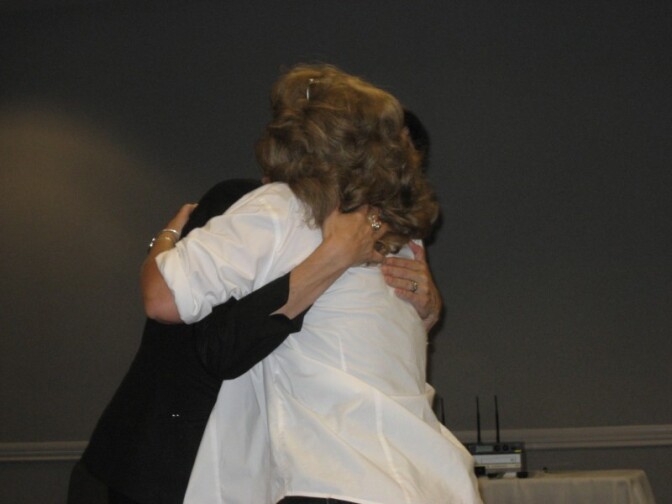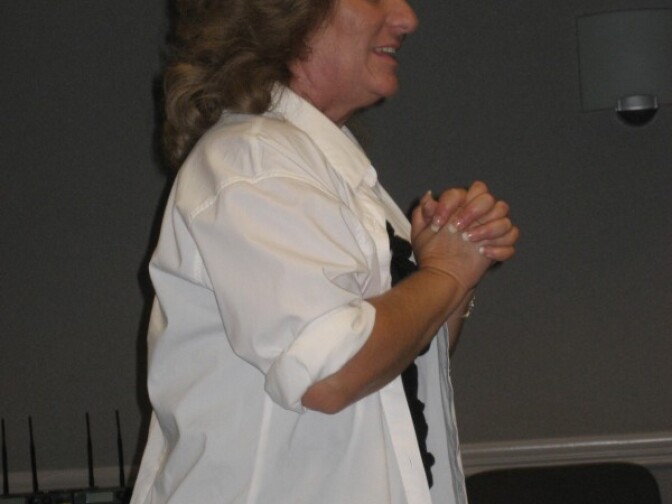With our free press under threat and federal funding for public media gone, your support matters more than ever. Help keep the LAist newsroom strong, become a monthly member or increase your support today.
Demand up at OC domestic violence shelters
When the economy goes down, the number of domestic abuse cases usually goes up. KPCC’s Susan Valot says that seems to be the case in Orange County, where it’s taking more work to place battered women and their children in safe havens.
Susan Valot: Nearly three decades ago, Brenda Clubine was a young wife and mother. Things seemed pretty rosy until the last year of her marriage.
Brenda Clubine: It got real crazy and real violent really fast. I had skull fractures. I had broken bones. I had numerous things. You know, and the injuries just kept getting worse.
Valot: Clubine went back to her husband 11 times. But after another black eye, she called a women’s shelter in Glendale. A woman took her info and then...
Clubine: She said, "Can you please hold?" And she came back on the line a few minutes later and she said, "I’m really sorry. We don’t have any beds right now." She said, "You know, it is getting close to the holidays and I’m really sorry," she said, "but what I can do is, we can – we’ll call you." Which meant that they were going to call my home. And I said, "Oh, I’m sorry." I said, "Never mind. Forget that I ever called."
Valot: A couple of months later, Brenda Clubine’s husband he came at her with a hammer. This time, she hit him with a bottle and killed him. Clubine served 26 years in prison in Chino for murder. She got out less than a year ago. What she found years ago – domestic violence shelters too crowded to take in women – is happening again.
Rocio Watson: (greeting women at shelter as she walks by) Hi ladies!
Women at shelter: Hi.
Watson: One of our groups going on...
Valot: Rocio Watson runs the Women’s Transitional Living Center, one of the main domestic violence shelters in Orange County. She pops her head in to say hello to a group of women, crammed onto flowery couches for a counseling session. Watson says for the first time in her shelter’s three-decade history, they’re referring women elsewhere.
Watson: Unfortunately, due to the financial crisis, we have seen a huge increase in domestic violence. We are completely full – at capacity. That’s in both our emergency shelter and our traditional housing program.
Valot: Watson says some calls are from women who’ve faced violence, but money trouble has magnified it. So Watson says women call to finally try to get out.
Watson: It’s not just us. I mean, in with talking with other people and other agencies that do similar work to what we do, they’re experiencing the same thing, you know. And we’ll call each other and say, "I have this lady on the phone and, you know, we might not be able to accommodate her because we don’t have any room. Do you have any room?" And they’re saying the same thing, "No we don’t."
Valot: Watson says a safety net program puts women in a motel for a week or so, until there’s space in a shelter. But they’ve used up the money for that already this year.
[Sound of re-enacted, typical hotline call at Human Options: (phone rings) "Hotline, can I help you?..."]
Valot: At Human Options, a smaller domestic violence shelter in Orange County, calls similar to this are coming into their domestic violence hotline more often.
[Sound of re-enacted, typical hotline call at Human Options: "Have you heard about our program? OK. This is a domestic violence shelter and we are located in Orange County..."]
Valot: Vivian Clecak is the founder of Human Options. She says in the past year or so, they’ve seen a shift.
Vivian Clecak: Calls have gone up about 25 percent in the emergency shelter. It’s not as much as the calls have gone up at the homeless shelters or food banks. And that’s because what we’re seeing is that women are terrified to leave.
They can’t imagine that they could support their children. Our calls at our counseling centers are up 60 percent. And the crisis level for both the shelter and the counseling centers is even higher.
Valot: Clecak says Human Options counselors are also referring more cases to child protective services.
[Sound from Sin by Silence documentary of 911 call from child in San Diego, screaming as mom is attacked by dad]
Child: He just knocked mommy.
911 Operator: OK.
Child: And he made some red marks on momma's, on momma's neck. [child screams] Oh my God!
911 Operator: What's the matter?
Child: (screaming) Something happened! Mommy! Mommy!
911 Operator: Hello? [dial tone]
Valot: A 911 call in the documentary Sin by Silence shows how domestic violence ripples through families. Domestic abuse survivor Brenda Clubine at times wiped her eyes during a recent screening in Anaheim.
Clubine: What I wish is that women would understand that they’re not alone, that they can make it [Clubine tries to keep her composure] on their own, that they don’t have to stay and that there are people and organizations willing to help them.
Valot: But in this economy, those organizations are struggling.
Domestic violence hotlines:
Women's Transitional Living Center 24-Hour Hotline: (714) 992-1931
Human Options 24-Hour Hotline: toll-free (877) 854-3594 or (949) 854-3554
Laura's House (Orange County) 24-Hour Hotline: toll-free (866)498-1511 (or) 949-498-1511
Los Angeles County Domestic Violence Hotline: toll-free (800) 978-3600
Alternatives to Domestic Violence (Riverside County) 24-Hour Crisis Hotline: (951) 683-0829
Option House (San Bernardino) 24-Hour Hotline: (909) 381-3472
National Domestic Abuse Hotline: 1-800-799-SAFE (7233)










